Welcome back to the Neuroscience Meets Social and Emotional Learning Podcast for Brain Fact Friday and EPISODE #175 that was inspired by our recent interview with Dr. Francis Lee Stevens whose book that was just released this week on Amazon, Affective Neuroscience in Psychotherapy[i] that reminded us that we can accelerate our results, experience less stress and psychopathology (like depression and anxiety) when we can understand the emotional science (affect is the scientific word for emotion) that can be mapped and understood within the depths of the human brain.
To access the images in the show notes, click here.
There were many AHA Moments during our interview with psychologist Dr. Stevens this week, but with mental health at the forefront of this podcast, and the fact that we are now into the last quarter of 2021, I wanted to provide something that we could all use to give us clarity and focus to finish this year on a strong, high note. When I thought about what Dr. Stevens taught us, and why an application of affective neuroscience could help patients with psychological disorders, I thought about that for a while and wondered how this week’s Brain Fact Friday could bring us to a heightened sense of clarity, focus and direction that would give us a razor’s edge advantage in our life, with whatever it is we are working on or moving towards, and set us up with the right footing for a solid Q1 in 2022.
In Today’s Brain Fact Friday, You Will Learn:
✔︎ Why a calm brain is important to achieve ANY level of success.
✔︎ Strategies to calm our brain/regulate ourselves before we can access the thinking/decision-making parts of our brain.
✔Why a calm, regulated brain, precedes mental clarity, needed for high performance.
✔︎ How to calm or regulate ourselves before we can access knowledge, well-being and high-performance.
From Focus to Calmness
Dr. Stevens taught us some great strategies that can help us to understand our emotions, and even reconsolidate past traumatic memories, but there was something I knew I was missing that comes before we can access those higher, thinking parts of the brain that we need when thinking or making decisions. Today’s topic is not just about how we can use the understanding of our brain to focus, so we can accomplish more, Friederike Fabritius dove deep into the neuroscience behind the focused brain on episode #27.[ii] She reminded us of the recipe needed for achieving peak performance as a mix of fun, and fear along with focus”[iii] but that’s not where I wanted to go with this episode. Then I saw it and it was as clear as ice as I thought about some of our past speakers.
I mentioned to Dr. Stevens that in order to apply any of the lessons he uses with his patients for accelerated results, and improved well-being, we had to get to a place of calmness, where we could step back from the busyness of our world and allow our thinking brain (or our Central Executive Network) to come back online. We have to be able to switch from our Thinking (Central Executive) Network to our Imagination (Default Mode Network) for this calmness to occur. I did talk about the importance of switching between our brain networks to allow for these flashes of creativity and insight to flow in episode #48 which is a good episode to review.[iv]
For this week’s brain fact Friday, I want to add a sense of calmness behind our clarity to push us forward. I remember my mentor Bob Proctor always saying to accelerate your results you need to “Speed Up and Calm Down” and he would give us examples of how he stayed focused by saying no to what’s unimportant and direct 100% of his energy and focus to what is. If you want to accelerate your results, it begins with a calm brain, that’s focused and ready for speed.
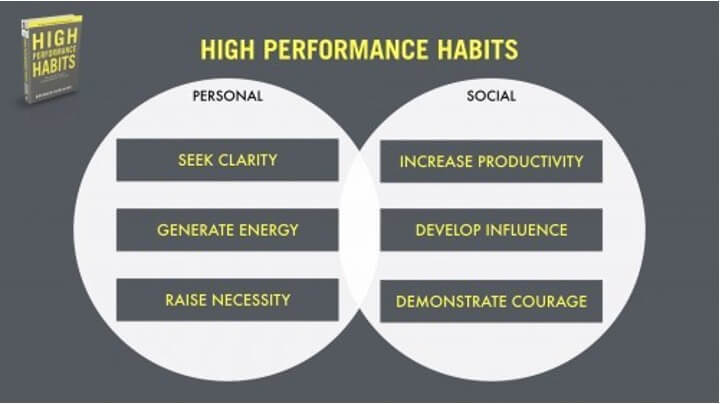
From Calmness to Clarity
Then we can take this calmness and laser focus to clarity. Clarity is one of the six habits that Brendon Burchard found that research shows pointed the needle towards high-performance vs those who underperform in his book, High Performance Habits: How Extraordinary People Become That Way[v] and it’s something I think about every morning before I begin my day. Then I thought of you, the listener, wherever you might be in the world. Maybe you are like Bryon Carpenter[vi] from the Fresh Air at Five Podcast[vii] who listens to our episodes in the dark, in the fresh air, while exercising on his morning walks in beautiful Abbotsford, British Columbia and then posts what he learns from the episode on Twitter, along with Josh Tovar[viii], from El Paso, Texas, who does the same. Or Leadership Coach Tivo Rojas-Cheatham[ix] who listens to the episodes and sends me his thoughts, ideas, and encouragement through LinkedIn. I can’t forget about Chris Gargano, from the New York Jets Organization, who listens to the podcast for ideas for his Leadership Class at NYU. Wherever you are listening from, my hopes are that this episode opens you up to all of the possibilities that come from a calm mind, providing clarity, an improved sense of self, maybe ideas for where else you can improve, with a longer-term vision of whatever it is that you are working on, or the legacy that you want to leave in this world. It all begins at the brain level.
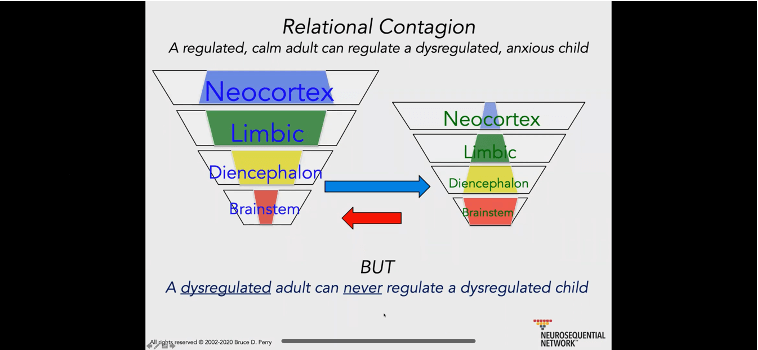
So, for this week’s Brain Fact Friday: I want to remind us of the importance of a calm brain. Dr. Perry’s NeuroSequential Theory is centered around the fact that we must learn to regulate ourselves first, before we can regulate others.
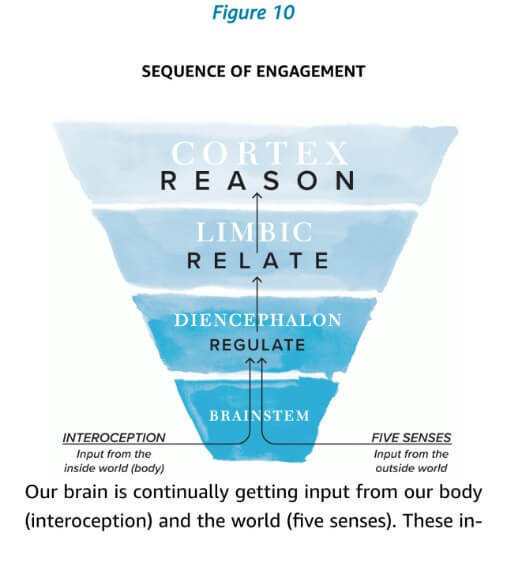
There is power in calmness as you can see with Dr. Perry’s image that shows how “A regulated, calm adult can regulate a dysregulated, anxious child.” Think back to Dr. Perry’s upside-down triangle of the brain, where we had to learn to regulate (or calm ourselves down) first, before we could access our thinking or reasoning brain, and remember that in order to regulate our brain, we must go from the reptilian brain, though the limbic or emotional brain, to get to the thinking/decision-making brain with the image of The Three Brains I’ve put in the show notes.
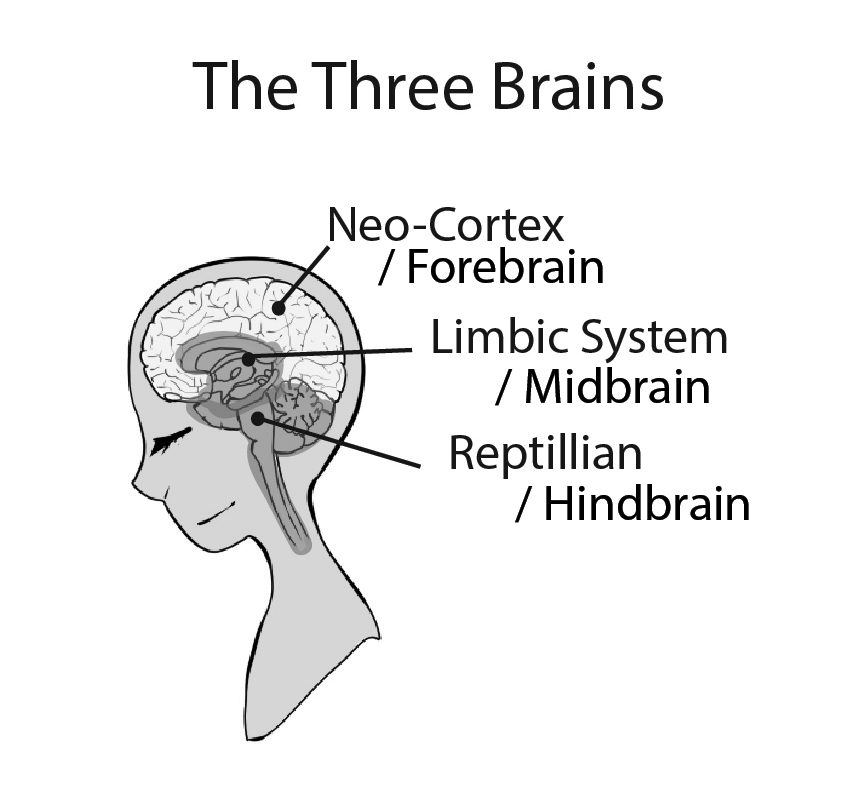
I saw a book written called Calm Clarity: How to Use Science to Rewire Your Brain for Greater Wisdom, Fulfillment and Joy[x] where the author explains her journey through each of these parts of the brain, calling them Brain 1.0 (Brainstem) to Brain 2.0 (Limbic Emotional Brain) to Brain 3.0 (Thinking/Reasoning Brain).
She created the Calm Clarity Program[xi] where she teaches participants how to reach the wisdom within Brain 3.0 with what she calls a “Mind-Hacker” toolkit to help people in a way that “physiologically supports greater physical, emotional, mental and spiritual well-being, alignment and integration.” (Preface, Calm Clarity-Due Quach)
Only then can we take what we learned from Dr. Stevens about the importance of understanding our emotions to reduce those things in our life that cause us increased stress and anxiety and access the clarity we will need to end our year as a high performer.
As we are closing out 2021, why not kick things up a notch and see how we can increase our calmness, focus and clarity, to end the year on a high note. It will make life easier when 2022 rolls around as you will have a head start.
Two Thoughts for Improving Focus and Clarity
- Improving Focus and Clarity Through Our Physical Well-Being
What areas can you work on to increase your physical well-being that will in turn give you more focus, clarity and energy?

We have covered the top 5 health staples[xii] and talk often of the importance of clean eating, exercise, nutrition and sleep, and will continue to research new areas that tip the needle forward for high performance, but it seems to always come back to these basic staples as well as continuing to find ways to improve our mental health.
- Improving Focus and Clarity Through Our Mental Well-Being
If I was to ask you the following questions, could you give me a quick and accurate answer?
- Do you know what you want, and where you are going?
- Do you know your daily direction?
- Do you integrate your wins every week?
- Do you face things that you are afraid of or do something that makes you uncomfortable daily?
- Do you feel your emotions instead of shutting them off?
I know there’s a lot involved with these two questions, but if we could look at what we can do every day to improve these two areas so that we are better than we were yesterday, we will be well on our way to heightened levels of focus and clarity to end our year intentionally and on a high note. But remember, it begins when we step back, take some deep breaths from our work, and access whatever it is for us that brings us a sense of peace and calmness in our thinking brain.
I hope you have found this week’s Brain Fact Friday as helpful as I have—and that we can all take some time to live and experience this sense of calmness that must come before we can break through to new levels of achievement.
I’ll see you next week, and the following week, I’m beyond excited for our FIRST Panel Interview and welcoming back Dr. Howard Rankin, Dr. Jon Lieff, Horacio Sanchez and Tom Beakbane who will discuss how new advancements in neuroscience can help and advance our educational system.
We will also be speaking with my good friend Brian Stenzler[xiii], with his NEW book that helps parents address mental health with their children as we continue to search for new ideas and strategies to keep our next generation stay physically and mentally well.
Final Thoughts:
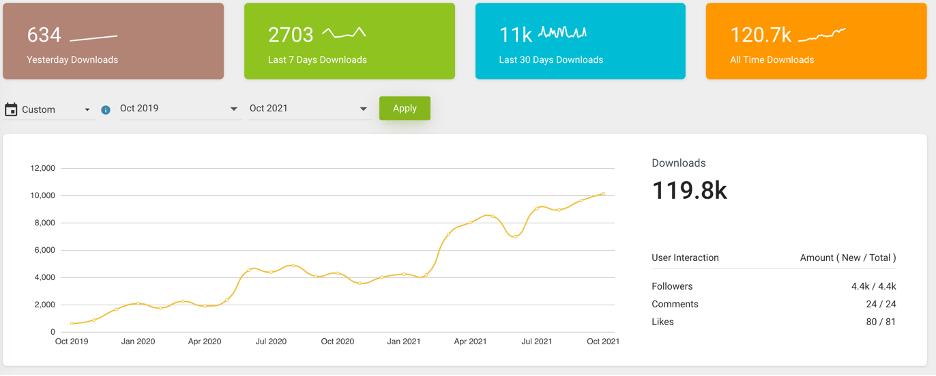
Before I close out this episode, I wanted to mention it’s hard to not notice the feedback from those listening around the world and the fact that our downloads have reached an all-time high, surpassing where we were last month, with over 11,000 downloads monthly. I want to thank all of you who tune in, and download an episode, share what you are learning on social media and send me messages. As new listeners come on board, I wanted to let you know that we do have a community that you can join and gain access to others around the world who are also listening, learning, and applying what they are learning. To join us, click on the link in the show notes, so that we can all stay connected in the Neuroscience Meets SEL Facebook Group and continue to learn from each other in between episodes. I do look forward to seeing you there. Have an incredible weekend.
Neuroscience Meets SEL Facebook Group
FOLLOW ANDREA SAMADI:
YouTube Channel: https://www.youtube.com/c/AndreaSamadi
Website https://www.achieveit360.com/
LinkedIn: https://www.linkedin.com/in/samadi/
Facebook: https://www.facebook.com/Achieveit360com
Neuroscience Meets SEL Facebook Group https://www.facebook.com/groups/2975814899101697
Twitter: https://twitter.com/andreasamadi
Instagram: https://www.instagram.com/andreasamadi/
REFERENCES:
[i] https://www.drfrancisstevens.com/book
[ii]Neuroscience Meets Social and Emotional Learning Podcast EPISODE #27 with Friederike Fabritius on “The Recipe for Achieving Peak Performace” https://andreasamadi.podbean.com/e/pioneer-in-the-field-of-neuroleadership-friederike-fabritius-on-the-recipe-for-achieving-peak-performance/
[iii] Friederike Fabritius: "Fun, Fear, and Focus: The Neurochemical Recipe for Achieving Peak Performance" | Talks at Google Published Jan.15, 2019 https://www.youtube.com/watch?v=pWi-oCySuFA
[iv]Neuroscience Meets Social and Emotional Learning Podcast EPISODE #48 “Brain Network Theory” https://andreasamadi.podbean.com/e/brain-network-theory-using-neuroscience-to-stay-productive-during-times-of-change-and-chaos/
[v] https://brendon.com/blog/high-performancehabits/
[vii] https://podcasts.apple.com/us/podcast/fresh-air-at-five/id1547552441
[viii] https://twitter.com/MPA_GOJAGUARS
[ix] https://www.linkedin.com/in/tivorc/
[x] Calm Clarity: How to Use Science to Rewire Your Brain by Due Quach Published May 15, 2018 https://www.amazon.com/Calm-Clarity-Science-Greater-Fulfillment-ebook/dp/B074YLY11S/ref=sr_1_1?crid=353KXYF7OXIIB&dchild=1&keywords=calm+clarity&qid=1635443224&s=digital-text&sprefix=calm+clar%2Cdigital-text%2C138&sr=1-1
[xi] https://www.calmclarity.org/
[xii]Neuroscience Meets Social and Emotional Learning Podcast BONUS EPISODE “Top 5 Health Staples” https://andreasamadi.podbean.com/e/bonus-episode-a-deep-dive-into-the-top-5-health-staples-and-review-of-seasons-1-4/
[xiii] Brian Stenzler on San Diego’s Morning Extra News https://www.cbs8.com/video/news/local/morning-extra/new-book-aims-to-help-parents-with-teens-address-their-kids-mental-health/509-00b0fbc9-a0fb-491f-97e7-34405db70377?jwsource=cl&fbclid=IwAR1hEoasamvrDVPixPzdLbFyggPpwfRX4kh19odkvuSr88YyIIVYt_RqDbs
No comments yet. Be the first to say something!